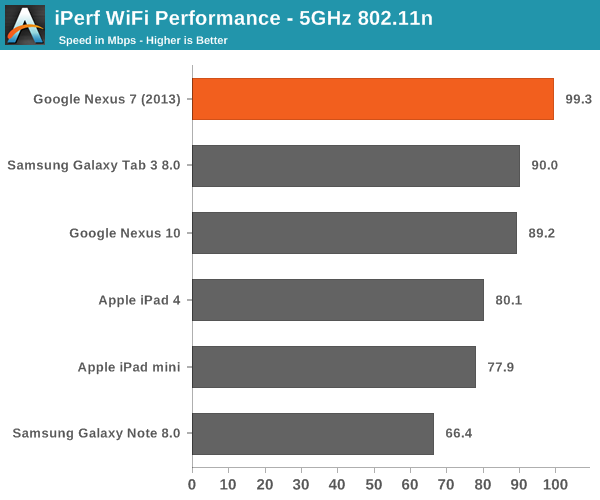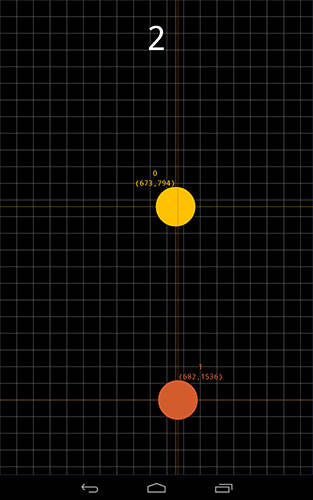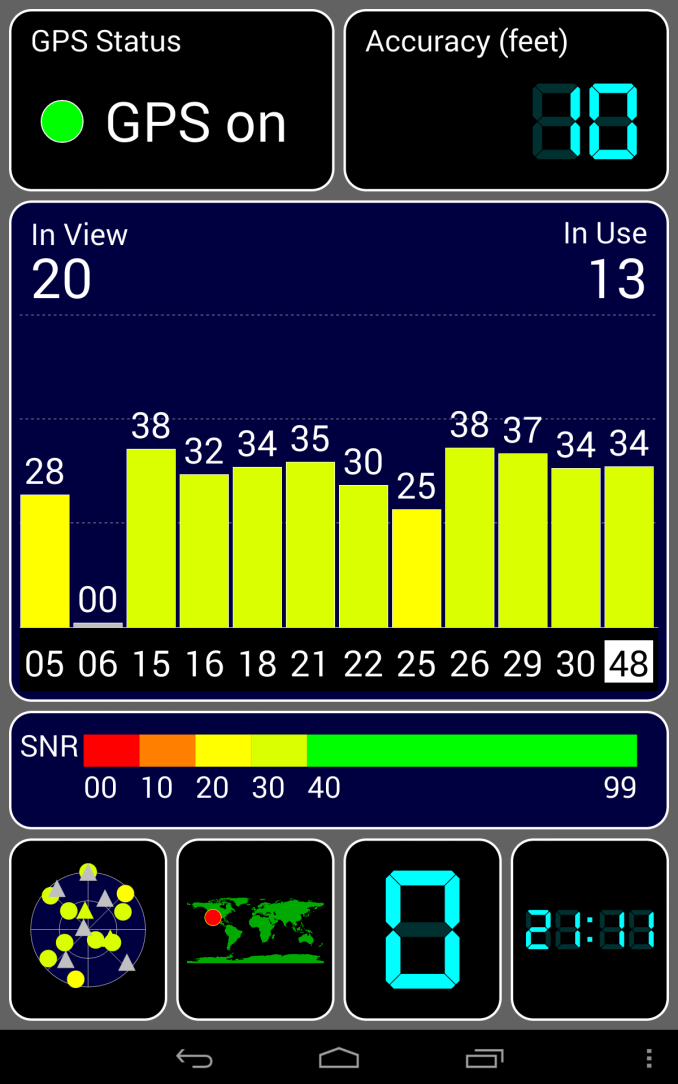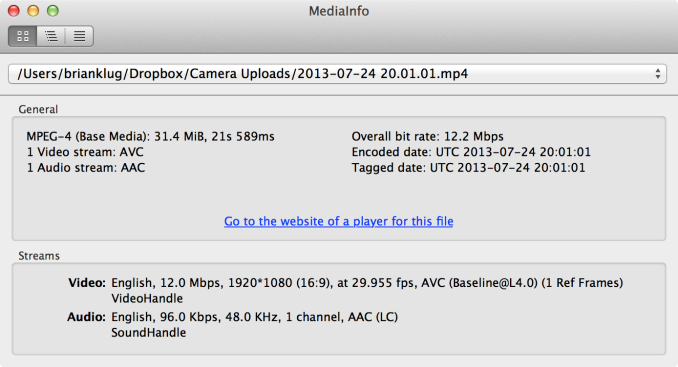The Nexus 7 (2013) Review
by Anand Lal Shimpi on August 22, 2013 6:00 PM ESTWiFi, GPS
I won't spend too much time on either of these points as Brian already did so in his initial review. WiFi duties are handled by Qualcomm's WCN3660 WiFi combo chip. The new Nexus 7 sees an update to include 5GHz 802.11n support, which is a very welcome addition. There's no 802.11ac, understandably for cost reasons. 802.11ac is probably the only thing missing from this otherwise awesome platform.

When it comes to GPS, there's good news and bad news. The good news is that Qualcomm's GNSS implementation remains the fastest we've tested as far as time to lock is concerned. The bad news is there seems to be an issue with the Nexus 7's impementation, likely in software, that results in the tablet randomly losing GPS lock. Update: It looks like this has been fixed!

Note that neither my Nexus 7 nor Brian's have exhibited the instability or consistent reboots that I've seen reports of. I had a single unexpected reboot during my GPS testing but that was it. Brian's sample has been running with over 22 days of constant uptime at this point. I also haven't seen any multitouch issues on my Nexus 7, although touch controllers are sometimes sourced from multiple vendors which could explain some of the issues others are seeing. Update: Looks like this one is fixed too!
Camera
The new Nexus 7 adds a 5MP rear facing camera, something its predecessor didn't have at all. While I rarely use my tablet for taking photos, I will admit the absence of a rear facing camera on the old Nexus 7 caught me off guard. Image quality out of the rear camera is decent. I threw together a gallery comparing the Nexus 7's rear camera to the iPad mini, MeMO Pad HD7 and Galaxy Tab 3 8.0:
In well lit situations and if you're sharing photos at lower resolutions, the Nexus 7's camera isn't bad at all. It's not the best thing in the world but in a pinch it's fine. I also threw in iPhone 5 samples as a reference in the gallery above.
Video on the Nexus 7 (2013) is 1080p30 at 12 Mbps, H.264 Baseline with 1 reference frame, and 96 kbps 48 KHz single channel AAC audio.


















202 Comments
View All Comments
JDG1980 - Thursday, August 22, 2013 - link
This is Anandtech, not the Wall Street Journal. Why are the business strategies of these companies relevant to who provides the best device at the best price? Why should consumers care who is subsidizing what?BMNify - Thursday, August 22, 2013 - link
Copy pasting from my above comment as you didn't go through it: If subsidised hardware kill off the hardware manufacturer's then you will be left with a monopoly that is Google who can charge you more later and make money on Ad's too like they do now. This is the reason why selling at-cost or dumping is not desirable.smartypnt4 - Thursday, August 22, 2013 - link
Interesting perspective. I hadn't heard a well-reasoned argument against selling at or near cost before now. Also, do you have a source to back up the claim that ASUS is making a significantly smaller margin on the N7 than they are on their other devices? Their MemoPad HD 7 is a 2012 N7 clone that's $150, so if the 2013 N7 is at cost, that has to be as well. And that's not being subsidized by Google, so if it were really at cost without some hypothetical Google subsidy, why would ASUS bother designing and selling it?psyside1 - Friday, August 23, 2013 - link
Thanks alot Anand, for listening us, and put the 16 vs 32GB version in your review, now i know i want the 32GB version! fanstastic review.ASEdouardD - Friday, August 23, 2013 - link
I know it's a great thing to add in the review, but I would frankly would have preferred not to know! As I bought the 16 GB model, hehe. Doubt it has a big impact on real world use though.akdj - Sunday, August 25, 2013 - link
Google most likely pays ASUS to make the tablet....they pay the price of the BOM & labor directly to ASUS. That's how they are making their money. Google is essentially giving the tablet away for you, and everything that IS you. Your friends. Your contacts. Your email. Your documents and music and movies....and, what they call the 'data mine'. They sell that info to third party companies and probably double their original $200 investment to ASUSsmartypnt4 - Sunday, August 25, 2013 - link
According to what evidence? It's widely known that Apple takes a very large margin on their products, which the Mini being the lowest margin (~40% if I remember correctly). There has been no indication of what the Nexus 7 actually costs to build. My point is that ASUS is selling their own tablets without Google at prices that make me think that the Nexus 7 isn't actually being sold at or under cost. I'm thinking it's probably relatively low-margin compared to the iOS devices, but everything in technology is low margin compared to iOS stuff (except Intel processors, that is).And yes, Google uses your information to target ads at you. That's not really news to anyone, and anyone buying into Android better know and be OK with that, or just not care.
amdwilliam1985 - Monday, August 26, 2013 - link
Thanks for the insight info about Google spying on us. Let's run the other way, Apple/M$ are so great and never touch our private sensitive data. Our data sitting in icloud/skydrive are so magical that nothing comes and tint it. Oh just how I love facebook is doing everything they can to make us feeling safer/happier about posting everything onto it. man oh man, the 21st century is all about Google mining your/our data and every other companies protecting you/us ;) /sSarcastic off, man grow up, crying about Google spying on you, lol. The way I see it is that if they're going to data mine us one way or the other, why not benefit from it? Why pay for your device twice? Once in privacy and once in physical dollar. I'm going with the one that I think is the least evil of them all, Google. Yes, I've used apple products before, didn't like how restricted iphone/ipad are. Didn't like how macbook air can't install the programs that are only running in windows, sigh...
Mivo - Friday, August 23, 2013 - link
You should probably post some sources for your claims. That aside, what is and is not desireable is a matter of perspective. I'd wager that most end customers are fine with ads or a walled garden, if that substantially lowers the price of a device. Just look at Amazon and their customers. (Or look at Apple and their customers who happily pay premium prices in spite of the walled garden.)Ananke - Friday, August 23, 2013 - link
Example: Asus buys from Foxconn at $220, and sells for $229. If it costs Foxconn 29.99 to manufacture and sell to Asus, is it considered "sold almost at cost" to end users by your logic?